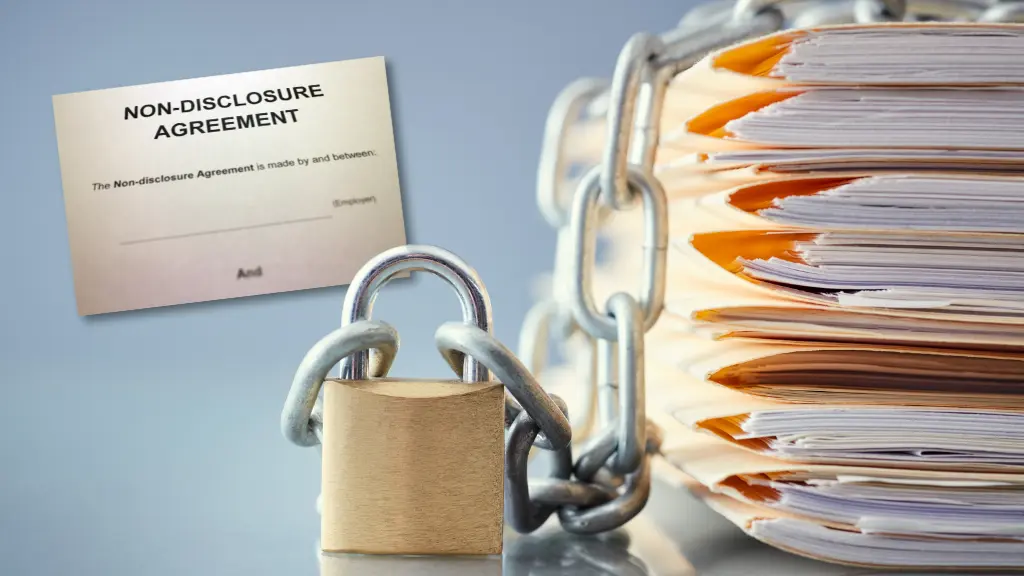
In the world of business and cooperation, keeping secrets is one of the most important aspects. Therefore, there are many policies and rules about this. One of the most popular is the NDA or confidentiality agreement.
You might be wondering what exactly an NDA is, why it is needed, and whether it is actually legally binding. This article will give you a full explanation of NDAs, including how they differ from MOUs to examples of how they can be applied!
What is a Non-Disclosure Agreement?
An NDA or Non-Disclosure Agreement is a legal agreement made to protect confidential information between two or more collaborating parties.
An NDA usually details the types of information that must be kept confidential, the rights and obligations of each signing party, and the legal consequences in the event of a breach of the agreement.
With an NDA in place, parties with confidential information can feel more secure in working together, as there is a guarantee of legal protection.
What is an NDA for?
Why are NDAs so important in the business world? The answer is simple: NDAs are made to protect confidential information that has strategic and financial value. There are several reasons why NDAs are necessary, including:
Is an NDA Binding?
Yes, NDAs are legally binding. This means that the parties signing the agreement are obliged to abide by all the terms that have been agreed upon. If one of the parties violates the NDA, for example by leaking confidential information, then the injured party has the right to claim compensation through legal channels.
The existence of an NDA is not just a formality, but has legal force. Therefore, it is very important to read and understand every clause in the NDA before you sign it.
What's the Difference between NDA and MOU?
Besides NDA, you might have also heard about MOU (Memorandum of Understanding). Then, what is the difference between NDA and MOU?
1. Purpose and Function
NDAs focus on protecting confidential information, while MOUs are documents that record the initial agreement between two parties before a more formal agreement is made. MOUs are usually used as the basis for more detailed agreements in the future.
2. Legal Nature
NDAs are legally binding, whereas MOUs are not always so. MOUs are often non-binding, meaning that they do not require the parties involved to fulfil all the contents of the MOU.
3. Scope
NDAs have a more specific scope, which is the protection of confidential information. Meanwhile, an MOU covers a broader range of matters, such as co-operation plans, division of tasks, and other matters that have not been detailed in the formal agreement.
How Long is an NDA Valid?
The duration of an NDA varies greatly, depending on the agreement between the parties involved. Generally, NDAs have a validity period ranging from a few months to a few years after the agreement is signed.
There are also confidentiality agreements that are valid as long as the protected information is still considered sensitive and valuable. However, in some cases NDAs are valid indefinitely until the information becomes public or no longer relevant.
It is important for you to ensure that the duration specified in the NDA suits your needs and the business situation. Do not hesitate to discuss with the counterparty so that all aspects, including the duration, are clear and do not disadvantage either party.
What are Examples of Confidentiality Agreements?
The following are some examples of situations where NDAs are often used:
1. Product Development Co-operation
When two or more companies work together to develop a new product, NDAs are often used to protect the ideas, designs, and technologies being developed.
2. Merger or Acquisition Talks
Before a merger or acquisition process, companies often conduct due diligence, which is an in-depth examination of the conditions of the company to be acquired.
In this process, NDAs are used to protect financial information, customer data, and other important information.
Companies seeking new executives may require prospective executives to sign an NDA before they access confidential information about the company's business strategy and future plans.
4. Collaboration Projects with Third Parties
In collaborative projects with consultants, vendors, or other business partners, an NDA is required to protect the business information and technology shared during the collaboration.
Do Freelancers Need NDAs Too?
You might think that NDAs are only required by big companies, but in reality, freelancers are also highly encouraged to have one.
As a freelancer, you may be involved in projects that require accessing company data, creative ideas, or strategic information. In situations like this, an NDA can provide legal protection that ensures that you won't face any legal issues later on due to the leakage of such information.
By signing an NDA, it shows that you are professional and value the trust given by the client. This can be a plus point that makes you more trusted by potential clients in the future.
Can leaking company secrets be criminalised?
The answer is yes! Leaking company secrets can be criminalised, especially if the leaked information harms other parties financially or damages the company's reputation.
In Indonesia, the act of leaking company secrets can be considered a violation of the law and can be subject to criminal sanctions. For example, Article 322 of the Criminal Code (KUHP) regulates the prohibition of divulging secrets entrusted to a person. Violation of this article is punishable by imprisonment of up to nine months.
Therefore, it is very important to maintain the confidentiality of the information you obtain in a work or business environment. Don't take the NDA you've signed lightly, as the legal consequences of a breach can be very serious.
Source: kontrakhukum.com



National Economy
Regional Economy
National Economy
Regional Economy